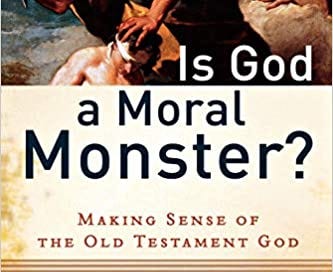Paul Copan‘s fine book Is God a Moral Monster?: Making Sense of the Old Testament God has got me thinking. From a few chapters on topics that are seemingly unrelated (food and females), the same theme emerges from both: holiness. Allow me a moment to pull this together.
Chapters 7-8 (parts I and II), titled “The Bible’s Ubiquitous Weirdness? Kosher Foods, Kooky Laws?” deal with food laws in the Old Testament. First, Copan sets the stage in Chapter 7 showing that
God was reminding Israel of her own distinctive, holy calling even in the very foods Israel was to eat. Animals that “crossed” or in a sense “transgressed” the individual and distincitve spheres of air, water, or land were considered unclean….So Israel’s land, Israel’s sacrifices, and Israel’s food all had social and theological significance. Israel’s various boundaries were to remind her of her relationship to God and to the nations around her. Just as God was set apart from human beings, Israel was to be set apart in its behavior and theology from the surrounding nations. Just as the tabernacle represented sacred space within Israel, so the land of Israel itself represented a set-apartness in contrast to the nations around it.” (p. 78)
Chapter 8 speaks specifically to kosher food laws. Briefly dispelling common notions about why certain foods were prohibited, Copan argues (to my surprise) that health/hygiene is a myth, since the context in which food prohibitions are found (e.g., Leviticus 11) is not concerned with health or hygiene. [Hermeneutical Hint: Context is the king that rules content.] Instead, the creation narrative (Genesis 1) shows animals are subdivided into categories according to their habitat: animals that walk on land; animals that fly in the air; animals that swim in water. Certain animals were declared “unclean” because these animals “symbolize a mixing or blurring of categories. In contrast, the clean animal has all the defining features of its class given at creation. So animals that ‘transgressed’ boundaries or overlapped spheres were to be avoided as unclean” (p. 80). Copan concludes
However one navigates through some of these Old Testament purity laws, the undergirding rationale behind these laws is Israel’s call to live holy lives in everything. That’s why the theme of holiness is explicitly mentioned in all the passages in which the prohibited food lists are given (Exod. 22:30-31; Lev. 11:44-45; 20:25-26; Deut. 14:4-21). (p. 86)
Whereas chapters 7-8 deals with food laws, chapter 10, “Misogynistic? Women in Israel,” deals with the status of women. As a call to holiness, God issues certain commands that lifts a woman’s status in an otherwise abusive patriarchal society. Noting that “in the ancient Near East, the mother was often under the control of the son” (p. 107), Copan shows that Leviticus 19:3 “commands a son to revere mother and father alike—and the mother is even listed first” (p. 107). Moreover, female equality is presumed in many OT passages (Genesis 1:27; 2:24; Exodus 20:12; Deuteronomy 5:16; 21:18-21; 27:16; Proverbs 6:20; 18:22; 19:26; 23:22; Song of Songs 6:3) implying that, in a culture which otherwise subordinates them to men, women are raised to an equal status. This sets God’s chosen people considerably apart. If children owe the same reverence to their mother as to their father, then Leviticus 19:3 (et al.) gives women equal authority over children in the home!
In the end, I think Copan’s analysis is biblically faithful showing that food habits and treatment of women reflect behaviors that must be distinct from surrounding culture. In our day of food indulgence and women subordination, these truths could not be more relevant. Hear the word of the LORD:
“Consecrate yourselves and be holy, because I am the LORD your God. Keep my decrees and follow them. I am the LORD, who makes you holy.”
(Leviticus 20:7–8)“Whatever you do, whether in word or deed, do it all in the name of the Lord Jesus, giving thanks to God the Father through him.”
(Col 3:17)




